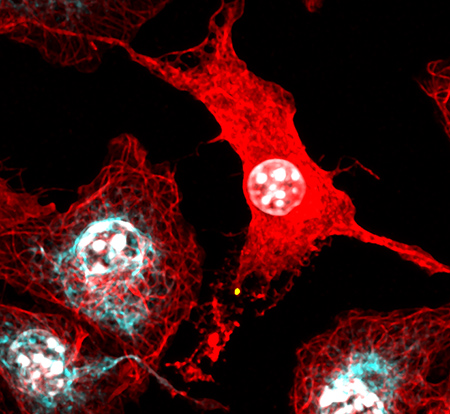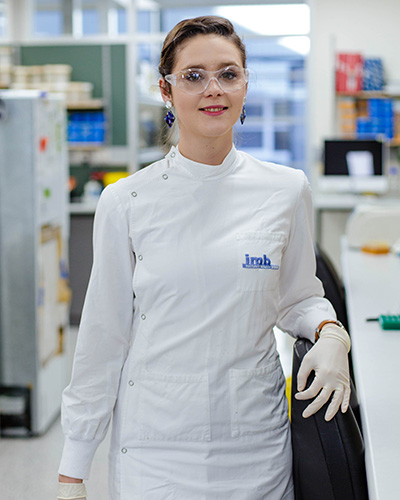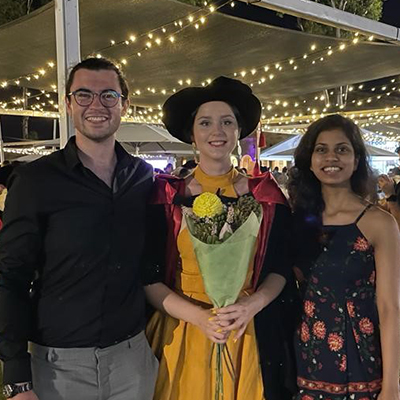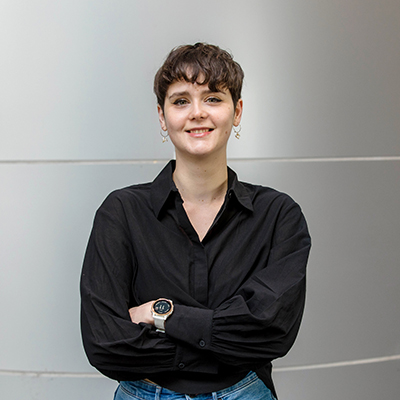Dr Caroline Holley is on a killing spree.
She meticulously plans and oversees an untold number of “spectacular deaths” as a Postdoctoral Research Fellow at IMB.
She is among a group of researchers in IMB’s Inflammasome Lab studying the behaviour of the immune cells that patrol a human body, searching for signs of infection - research that could give clues on treating diseases like rheumatoid arthritis and Alzheimer's disease.
'Explosive' research could help treat disease
“When these immune cells encounter a challenge like bacteria, they die very spectacularly – they explode,” Dr Holley says.
“Basically, their only purpose is to explode and die to sound an alarm bell and warn the surrounding tissues that something is wrong.
“We don’t know a heck of a lot about how the cells explode but we do know a biological protein complex called the inflammasome located in these immune cells triggers the explosion.
“I use high-resolution microscopy, to test and observe these cells dying to try and figure out what’s making them explode.”
When Dr Holley and her colleagues unravel the secrets of inflammasomes, the impact their findings will have on regulating the body’s immune response could be “explosive”.
“It’s a balancing act – if we can make cells explode when they should, we can make our immune response a bit better and if we can stop them from exploding when they shouldn’t, we can make inflammatory diseases like rheumatoid arthritis and Alzheimer’s a little less severe,” she explains.
From animals to anthrax
 The path to studying cell explosions started in primary school where Dr Holley’s interest in biology was sparked by a fast fascination with David Attenborough documentaries.
The path to studying cell explosions started in primary school where Dr Holley’s interest in biology was sparked by a fast fascination with David Attenborough documentaries.
But it wasn’t until she discovered anthrax as a Year 10 biology student at Beenleigh’s Trinity College that she discovered her aptitude for immunology.
Tasked with presenting a report on an infectious disease, Dr Holley hastily selected anthrax the day before the report was due.
“I looked at the pathways and the way our immune system can react so differently to anthrax depending on the way we take it in,” she recalls.
“If you breathe it in or if you get it on your skin, it presents as completely different diseases and I was fascinated. I researched and wrote my entire project in 12 hours and got an A+ for it.”
But is it a job?
She launched enthusiastically into a Bachelor of Biomedical Sciences at UQ fresh from school and even after participating in extracurricular lab and research courses, could not see a clear career path.
It wasn’t until she attended an IMB ‘Meet the Researchers’ event – lured by the promise of free food – that she realised she could do what she loved full-time.
It was here she met her future mentor, Honours supervisor and Inflammasome Lab boss, Professor Kate Schroder.

“How she was able to communicate her research vision to me was really inspiring,” Dr Holley says.
“I knew I wanted to do science but didn’t realise which area or who I wanted to do it with until I met her – and I’m still in her lab, eight years later.”
After a two-year stint as a research assistant following her Honours year, Dr Holley was ready to take on the creative freedom of leading a project and began PhD studies which she completed in April 2021.
She says IMB’s world-class equipment – including its renowned microscopy capabilities – and talented core facility staff piqued her initial interest but the opportunities it provided motivated her to stay and progress her career.
Mentoring and moving on
A recipient of IMB’s Women in Science and Technology Fund – created to help women overcome gender-based inequities – Dr Holley will use her funding to undertake a prestigious European Molecular Biology Organization (EMBO) course.
"Part of the reason Kate is such a good boss is she's not only good at the science - which is what we're trained to do - but she's also good at the stuff scientists are not really trained in, and that's management, mentoring and leadership.
"Women in STEM face pretty unique challenges at the moment, particularly when it comes to having research funded, so this is a great opportunity for me to develop those soft skills in management and leadership."
Give to our Women in Science and Technology Fund and help empower researchers like Dr Holley to overcome barriers and make discoveries that will benefit our local and global communities
They are skills she is already flexing as mentor and supervisor to a PhD student in the Inflammasome Lab, influenced by her own mentorship with Professor Schroder.
“The more time I spent in Kate’s lab, the more I realised that while there are good projects and good labs everywhere, in terms of choosing a mentor – especially as a woman in STEM – the right one can have a huge impact on your entire career.”
With a firm grounding and strong support network, Dr Holley is preparing to make her next move and continue her cutting edge immunology research overseas in late 2022.

